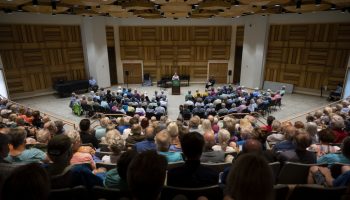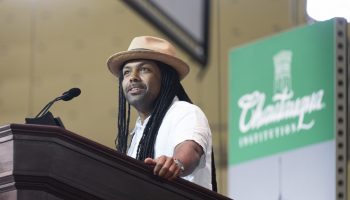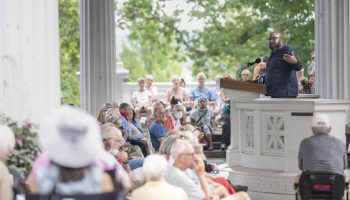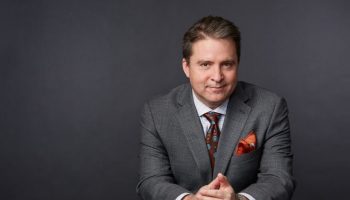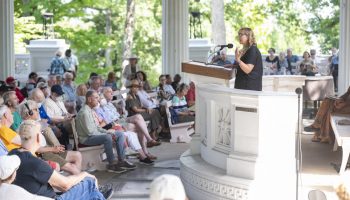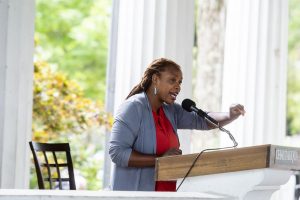
For the past two years, Heather McGhee has been on a walk — one that has taken her from Mississippi, to Alaska to California — a walk that began after an unexpected phone call.
McGhee, author and distinguished senior fellow at the think tank Demos, began her interfaith lecture on Wednesday in the Hall of Philosophy by taking Chautauquans back to the “racially charged” summer of 2016, when she made her first appearance on C-SPAN’s “Washington Journal.” The show invites guests — typically journalists and policymakers — to discuss current issues, and viewer calls are a staple of the program.
Originally, McGhee planned to touch on issues like rising student loan debt, raising the minimum wage for low-paid workers and voting rights during the program.
“But about halfway through the show, I got a call with a question that I was absolutely not expecting,” McGhee said.
The call was from Garry Civitello — a white man from North Carolina who openly admitted his prejudices, particularly toward black men, on live television. But Civitello wasn’t seeking to spread his prejudiced preconceptions; he was trying to change them.
“ ‘I want to know what (McGhee) can do to help me become a better American,’ ” McGhee said, quoting Civitello. “So there I am, in this seat, with this earpiece, … and I just said the first thing that came to mind, which was, ‘Thank you.’ ”
She thanked Civitello for his courage to admit something most would never admit.
“I also thanked (Civitello) because I felt that he had opened up a conversation that, at the time, was becoming electrified and charged; and in the static and the noise of all that, we weren’t hearing each other at all,” McGhee said.
But most importantly, McGhee was thankful for Civitello’s acknowledgment that overcoming his prejudices would make him a better American. So she offered him advice on how to do just that — she recommended he get to know black families, read about the contributions African Americans have made to the United States throughout history, and if he’s a religious person, to join an interracial church.
And then her discussion with Civitello was over, but his journey was not — his journey, or “walk” as he described it, had just begun.
Civitello later told McGhee, “It was like you wiped the dirt from a window, and let the light in.” He held himself accountable for his discriminatory fears and anxieties — prejudices that affect the daily lives of black Americans.
“He has a responsibility to get over (his fears) and he knows that,” McGhee said. “One of the other things he did was to start taking little pictures on his iPhone of all the Confederate flags he saw on people’s jackets, on their bumper stickers, on people’s lawns. For him, before his ‘walk,’ as he calls it, he didn’t really think about (Confederate memorabilia).”
Civitello is on a walk to overcome his prejudice for personal reasons, according to McGhee. Through his walk to rid himself of what he described as a weight on his chest, McGhee was forced to ask herself: What are the costs of racism to white people?
She said she needed to focus on this question because American society has been sold into “a zero-sum way of looking at the world.”
“What’s good for you is bad for me; my gain has to come at your expense,” McGhee said. “That’s really the worldview that’s being sold so often right now, particularly when it comes to race. ‘If there are more immigrants of color in the country coming from … Central America and the Caribbean and Asia, well — that must be why the factories are closing. That must be why the schools have less money.’ ”
McGhee thought extensively about this zero-sum paradigm and had an “a-ha” moment — many racial and economic justice advocates have only been talking about how racism benefits white people, and not how it harms them, as well. If this sentiment holds true, then McGhee asks, “How can a multi-racial democracy thrive?”
Currently, Americans — especially white Americans — are buying the idea that “some groups of people are simply worth more than others.” It’s an old belief that McGhee said is not just present in modern America, but is vigorously marketed.
“My journey these past two years has been to ask the question, ‘Yes, they are buying it; the Garrys of the world are buying it,’ ” McGhee said. “But what are they paying for it? And what have we all paid for it over the course of our history?”
Two years ago, McGhee began her own walk — she has traveled throughout the United States to uncover the ways in which racism is strategically and politically employed to divide neighbors. She has been exploring how this deliberate use of racism alters everything in U.S. society, from wages down to the air different citizens breathe.
“One of the most profound ways that this zero-sum lie has shaped America has been to make cross-racial solidarity between working class people almost impossible,” McGhee said. “This has happened — it’s been a tool of division to undermine collective action for all of our economic history.”
As this zero-sum lie exists and thrives in the United States, workers frequently act against their own best interests. She witnessed factory workers at an auto-manufacturing plant in Canton, Mississippi, vote against unionization. It was a divisive vote, and had the majority of workers voted in favor of unionizing, they would have received higher wages, health care and other benefits. McGhee wanted to know why the majority of workers turned these benefits down.
Many of the factory workers viewed unions as a system to benefit black people.
“It seemed that the word ‘union’ itself had become a dog whistle with code for the North,” McGhee said, “for undeserving people of color who need the union’s help to compensate, perhaps, for some flaw in their character.”
Elsewhere, she has talked with fast food workers of all races and ethnicities at restaurants like McDonald’s, Taco Bell, Popeye’s and Domino’s Pizza who have come together to advocate for a $15-hourly wage. One worker, Terrence, said the uniting factor between all the employees is that “they all get up and work,” that all of the employees, of all races, are struggling and should fight together for what’s right.
So these are the material costs of racism, but what about the spiritual ones? In the midst of discussions centered on systematic financial racism and how segregation is to everybody’s detriment, McGhee said people would “turn to how they felt, on a soul level.”
She quoted Jim Wallis, American theologian and activist, who referred to whiteness as an idol, something that separates people from God.
“ ‘It gives us an identity that is false, one filled with wrongful pride, one that perpetuates both injustice and oppression,” McGhee said, quoting Wallis. “He says, ‘For American democracy to be real for all its citizens, we must die to whiteness.’ ”
The identity of whiteness was created to establish who holds societal privilege.
“It was identity created for violent, oppressive profit, to say who had the privileges of our society and who did not,” McGhee said. “So (Wallis) says, ‘Only if we die to whiteness, can we become alive to our true identity, as human beings of one race, the human race.’ ”
McGhee believes that the zero-sum paradigm can be rejected, and everybody can be welcoming to people of all races, and come to realize the societal benefits from that inclusion. She visited Lewiston, Maine, a rural town that had been depopulated due to mills and factories moving out of the area.
“But towards the end of the main street, you could see it came alive,” McGhee said. “And it came alive with the shops and businesses of black, Muslim immigrants from Africa. … And they have reanimated this town.”
Lives are being transformed across the country by interracial community relationships in towns like Lewiston, according to McGhee — a narrative subverted by rhetoric leading many Americans to believe that immigrants are dangerous, or that there should be a Muslim ban.
“But that doesn’t have to be our story, does it?” McGhee asked. “It doesn’t have to be our story. If a man named Garry, who spent most of his days, and still today, watching TV with his dog, can reach out to the most unlikely person — a black, dreadlocked, progressive woman from Brooklyn — and forge a friendship and change, well then for Garry’s sake, don’t you think we all can?”

